外研版八年级英语下册教案Module10
外研版 八年级下册 英语 教案:Module 10 Unit 2

Write a passage describing an important event in the past and giving background information.
Decide where you are likely to read the passage. And pick up the right title.
a) In a book about the history of radio.
b) In the life story of a famous radio presenter.
本活动是一个语言输出训练,通过给出每项写作环节分步指导,为学生写作提供支架,同时也使得学生写作内容更符合正确的逻辑。也旨在通过一个简单的写作,综合复习并运用本课写个人经历的文章的写作结构。
Step7
Summary
Now it’s time for us to conclude what we learned in this class.
利用学案进行当堂检测,
巩固学生对本课内容的掌握。
Step9Homework
The homework is I. P83.4
II. Write a passage describing an important event in the past and giving background information.
Unit 2 It seemed that they were speaking to me in person.
2025(外研版)英语八年级下册 Module 10 大单元教学设计
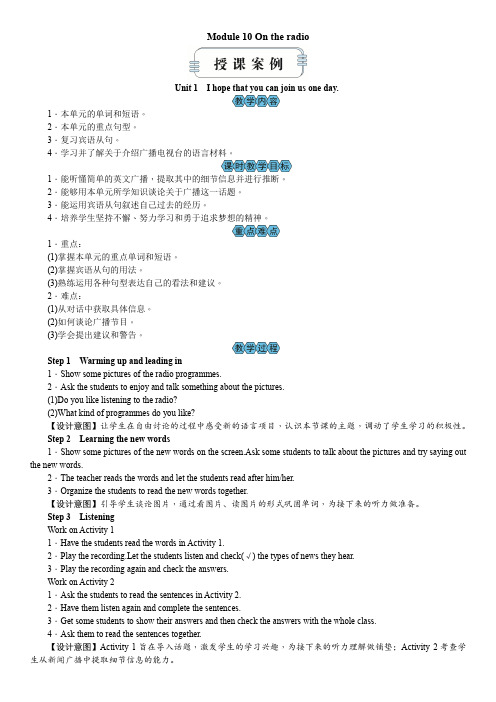
Module 10 On the radioUnit 1I hope that you can join us one day.1.本单元的单词和短语。
2.本单元的重点句型。
3.复习宾语从句。
4.学习并了解关于介绍广播电视台的语言材料。
1.能听懂简单的英文广播,提取其中的细节信息并进行推断。
2.能够用本单元所学知识谈论关于广播这一话题。
3.能运用宾语从句叙述自己过去的经历。
4.培养学生坚持不懈、努力学习和勇于追求梦想的精神。
1.重点:(1)掌握本单元的重点单词和短语。
(2)掌握宾语从句的用法。
(3)熟练运用各种句型表达自己的看法和建议。
2.难点:(1)从对话中获取具体信息。
(2)如何谈论广播节目。
(3)学会提出建议和警告。
Step 1Warming up and leading in1.Show some pictures of the radio programmes.2.Ask the students to enjoy and talk something about the pictures.(1)Do you like listening to the radio?(2)What kind of programmes do you like?【设计意图】让学生在自由讨论的过程中感受新的语言项目,认识本节课的主题,调动了学生学习的积极性。
Step 2Learning the new words1.Show some pictures of the new words on the screen.Ask some students to talk about the pictures and try saying out the new words.2.The teacher reads the words and let the students read after him/her.3.Organize the students to read the new words together.【设计意图】引导学生谈论图片,通过看图片、读图片的形式巩固单词,为接下来的听力做准备。
外研版八年级下册Module10教案
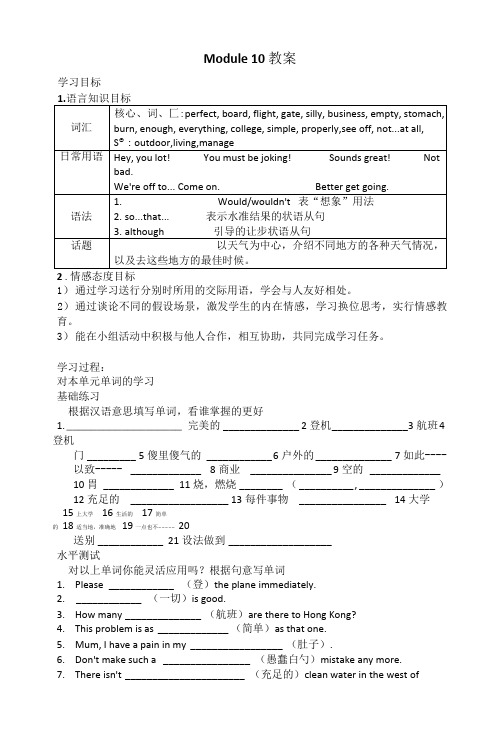
Module 10 教案学习目标2 .情感态度目标1)通过学习送行分别时所用的交际用语,学会与人友好相处。
2)通过谈论不同的假设场景,激发学生的内在情感,学习换位思考,实行情感教育。
3)能在小组活动中积极与他人合作,相互协助,共同完成学习任务。
学习过程:对本单元单词的学习基础练习根据汉语意思填写单词,看谁掌握的更好1.___________________ 完美的______________ 2登机______________ 3航班4登机门_________ 5傻里傻气的 ____________ 6户外的______________ 7如此---- 以致----- _____________ 8商业 _______________ 9空的_____________ 10胃 _____________ 11烧,燃烧________ ( __________ , ______________ )12充足的 __________________ 13每件事物 ________________ 14大学15上大学16生活的17简单的18适当地,准确地19 一点也不----- 20送别____________ 21设法做到___________________水平测试对以上单词你能灵活应用吗?根据句意写单词1.Please ____________ (登)the plane immediately.2.____________ (一切)is good.3.How many ______________ (航班)are there to Hong Kong?4.This problem is as _____________ (简单)as that one.5.Mum, I have a pain in my _________________ (肚子).6.Don't make such a ________________ (愚蠢白勺)mistake any more.7.There isn't ______________________ (充足的)clean water in the west ofChina.8.This is the __________________ (完美的)photo in my life.9.You will against the law if you ______________________ (烧)the forest.10.Now,more and more people like sports __________________ (户夕卜).11.That man plays the violin in the street for ___________________ (生活).12.Our headmaster often goes on ___________________ (出差).13.If you go to the supermarket, you can enter it from the g _______ .14.Basketball is an ______ gameUnitl I would go to London学习过程一. Read part3 quickly, then do exercise 4 (课本81 页)二・Read the dialogue again and fill in the blanks.Sally is leaving for L _________ . Her f _______ i s CA937. Some of her friends ares _________ her off at the airport. They were talking about the big cities they would like to go. Lingling said she would like to go to England and go to a big o ____________ pop concert, but she wouldn't t __________ the plane, because she was afraid that something would go w __________ w ith the plane. Betty thought it was s ________ to think so. At last, Sally said she would be h ________ to stay with them all. But she had to b _______ the plane then. They said goodbye to each other and promised to stayin t _______ .三.结合以下知识点读课文,然后翻译课文句子1.would like to do sth. = want to do sth. 想做某事would like sth. = want sth.想要某物Would you like to be a volunteer of the Olympic Games?Yes, Kd like/love to.Would you like some tea? Yes, please. / No, thanks.Grammar: would 表示“想象"的用法Imagine I had lots of money like Bill Gates . I would help the poor children in the world to go to school2.在肯定句中,如果前一句的主语和后一句的主语是两个不同的人或物,又做相同的一件事,就用so引导倒装句;如果是否定句,则用neither或nor引导。
新外研版八年级英语下册导学案Module 10-On the radio(Unit1-Unit3)

外研版八年级英语下册导学案Module10 On the radioUnit1 I hope that you can join us one day一、学习目标:1.知识目标:(1)掌握下列词汇:director, avoid, background, background, national, international, interview, on air, presenter(2)掌握下列句型及短语:①Thank you for showing us around.②When it’s o n, it means we’re on air.③Come this way.④It gets crazy in here.⑤show sb. around ⑥on air⑦avoid doing sth.⑧make noise ⑨in the backgroun⑩ keep studying2.能力目标:能够听懂和读懂在广播中常用的词汇、短语和句型,并将节目与常用词汇对应起来。
3.情感目标:初步了解新闻传媒,了解媒体人的工作。
二、学习重、难点:1.重点:掌握宾语从句,掌握动词后接(to)+v.或v.ing的形式。
2.难点:掌握动词(to)+v.或v.ing的形式作宾语三、自主学习:1.词汇速记引领,带领(v)________ 避免,防止(v)________背景(n)__________国家的,国内的(adj)______direct(v) → _____(n)导演,主管,经理present(v) → __________(n)主持人2.短语互译be on________ avoid doing sth___________ make noise_____________come this way_____________ over there______________带某人参观______________(广播或电视)播出_________________四、学习过程:Step1. Warming-upFree talk: Do you listen to the radio?Do you like listening to the sports news programme?Do you like listening to the news programme?Do you like listening to music?Which presenter do you like best?Step2.Pre-listening1.Listen and check(√ ) the types of news you hear.culture government sports weather2.Listen again and complete the sentences.(1)Zhang Li reads ______________________________________ on Radio Beijing.(2)The president of Russia will stay in China for________________.(3)The match is between _______________and_________________.Step3.Fast-listeningListen and answer:1.What should we avoid doing in the background?2.Do they collect the latest national and international news in the newsroom?Step4.Careful-listeningListen again and complete the notes.1.When the red light is on,it means______________________________________.2.We collect_____________________________and write reports in the newsroom.3.You should________________________________if you want to be a presenter.4.This is also where we_________________________with the big sports stars.plete the sentences with the words in the box.1.Newspaper and television programmes often have__________with famous people.2.More and more ___________students are coming to China to learn Chinese.3.Every country has its own ________hero—a person who did something very important for the country and its people.4.Try to_______drinking too much tea or coffee, or you will not be able to sleep well.5.Could you speak a l ittle bit louder,please?It is very noisy in the ________________.Step6.Work in pairs.Ask and answer questions about the radio.1.What do you like listening to?2.What do you not like listening to?3.What programme did you listen to the last time you turned on the radio?4.What do you need to do if you want to be a presenter?nguage points.1.show v. 引领,带领【语境领悟】*Thank you for showing us around. 感谢你带领我们参观。
外研版八年级英语下册教案 M10U1
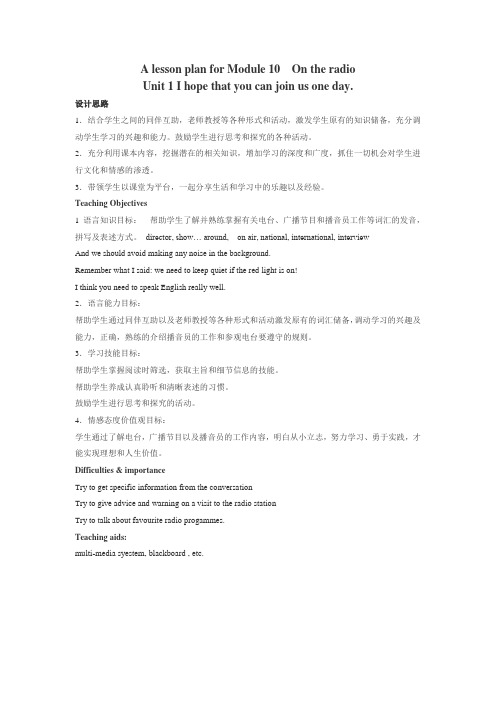
A lesson plan for Module 10 On the radioUnit 1 I hope that you can join us one day.设计思路1.结合学生之间的同伴互助,老师教授等各种形式和活动,激发学生原有的知识储备,充分调动学生学习的兴趣和能力。
鼓励学生进行思考和探究的各种活动。
2.充分利用课本内容,挖掘潜在的相关知识,增加学习的深度和广度,抓住一切机会对学生进行文化和情感的渗透。
3.带领学生以课堂为平台,一起分享生活和学习中的乐趣以及经验。
Teaching Objectives1 语言知识目标:帮助学生了解并熟练掌握有关电台、广播节目和播音员工作等词汇的发音,拼写及表述方式。
director, show… around, on air, national, international, interviewAnd we should avoid making any noise in the background.Remember what I said: we need to keep quiet if the red light is on!I think you need to speak English really well.2.语言能力目标:帮助学生通过同伴互助以及老师教授等各种形式和活动激发原有的词汇储备,调动学习的兴趣及能力,正确,熟练的介绍播音员的工作和参观电台要遵守的规则。
3.学习技能目标:帮助学生掌握阅读时筛选,获取主旨和细节信息的技能。
帮助学生养成认真聆听和清晰表述的习惯。
鼓励学生进行思考和探究的活动。
4.情感态度价值观目标:学生通过了解电台,广播节目以及播音员的工作内容,明白从小立志,努力学习、勇于实践,才能实现理想和人生价值。
Difficulties & importanceTry to get specific information from the conversationTry to give advice and warning on a visit to the radio stationTry to talk about favourite radio progammes.Teaching aids:multi-media syestem, blackboard , etc.。
八年级下册外研版Module 10 Unit 2教案(含反思)
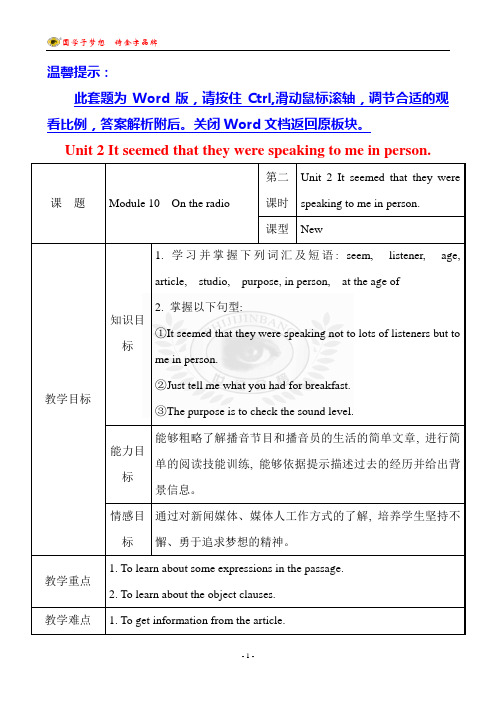
温馨提示:此套题为Word版,请按住Ctrl,滑动鼠标滚轴,调节合适的观看比例,答案解析附后。
关闭Word文档返回原板块。
Unit 2 It seemed that they were speaking to me in person.2. 掌握以下句型:知识目①It seemed that they were speaking not to lots of listeners but tome in person.②Just tell me what you had for breakfast.③The purpose is to check the sound level.能够粗略了解播音节目和播音员的生活的简单文章能力目单的阅读技能训练, 能够依据提示描述过去的经历并给出背景信息。
情感目通过对新闻媒体、媒体人工作方式的了解and use their own words todescribe.words to describe.Show the students some pictures about the radio, check and teach the new words. 1. Look and say. Follow the teacher to say as quickly as possible.2. Read the new words together and recite them.续表Careful-reading(细读) 1. Let students choose the best answerHow old is the writer?B. 9C. 50When the writer was_________, he asked for part-time jobs.B. 4C. 9 Read paragraphs 1-4 and choose the best answer in groups.Keys:①A②C2. Read paragraphs 5-6 and answer theThe writer had eggs,fruit and some milk for supper. ()4. Ask them to read the whole passage and complete the sentences in Activity 3. passage and complete the sentences in Activity 3.Get the students watch avideo and read with it, then let them read loudly in 1. Read the passage in grous.1. Organize students to read the passage again and find the language points. Let them discuss in groups and solve their problems.2. Ask three little teachers to help the students solve their again and find the language points. Discuss in groups and solve problems.2. Little teachers come to the front and help other students solve the language points,续表1. _________ fourteen, he left school and went to London.2. You should meet Jim and say sorry to him ______.3. That man only_________me but said nothing.4. You can’t stand ______the onⅡ.1. not; but2. grew older3. looked down4. talking about5. doing a sound check简低头看, 看见了一只猫躺在地上。
初二下外研版模块十教案
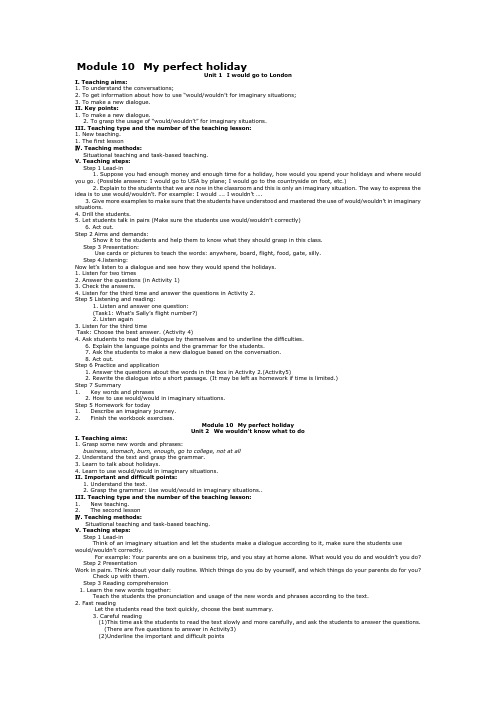
Module 10 My perfect holidayUnit 1 I would go to LondonI. Teaching aims:1. To understand the conversations;2. To get information about how to use “would/wouldn’t for imaginary situations;3. To make a new dialogue.II. Key points:1. To make a new dialogue.2. To grasp the usage of “would/wouldn’t” for imaginary situations.III. Teaching type and the number of the teaching lesson:1. New teaching.1. The first lessonⅣ. Teaching methods:Situational teaching and task-based teaching.V. Teaching steps:Step 1 Lead-in1. Suppose you had enough money and enough time for a holiday, how would you spend your holidays and where would you go. (Possible answers: I would go to USA by plane; I would go to the countryside on foot, etc.)2. Explain to the students that we are now in the classroom and this is only an imaginary situation. The way to express the idea is to use would/wouldn’t. For example: I would …. I wouldn’t ….3. Give more examples to make sure that the students have understood and mastered the use of would/wouldn’t in imaginary situations.4. Drill the students.5. Let students talk in pairs (Make sure the students use would/wouldn’t c orrectly)6. Act out.Step 2 Aims and demands:Show it to the students and help them to know what they should grasp in this class.Step 3 Presentation:Use cards or pictures to teach the words: anywhere, board, flight, food, gate, silly.Step 4.listening:Now let’s listen to a dialogue and see how they would spend the holidays.1. Listen for two times2. Answer the questions (in Activity 1)3. Check the answers.4. Listen for the third time and answer the questions in Activity 2.Step 5 Listening and reading:1. Listen and answer one question:(Task1: What’s Sally’s flight number?)2. Listen again3. Listen for the third timeTask: Choose the best answer. (Activity 4)4. Ask students to read the dialogue by themselves and to underline the difficulties.6. Explain the language points and the grammar for the students.7. Ask the students to make a new dialogue based on the conversation.8. Act out.Step 6 Practice and application1. Answer the questions about the words in the box in Activity2.(Activity5)2. Rewrite the dialogue into a short passage. (It may be left as homework if time is limited.)Step 7 Summary1. Key words and phrases2. How to use would/would in imaginary situations.Step 5 Homework for today1. Describe an imaginary journey.2. Finish the workbook exercises.Module 10 My perfect holidayUnit 2 We wouldn’t know what to doI. Teaching aims:1. Grasp some new words and phrases:business, stomach, burn, enough, go to college, not at all2. Understand the text and grasp the grammar.3. Learn to talk about holidays.4. Learn to use would/would in imaginary situations.II. Important and difficult points:1. Understand the text.2. Grasp the grammar: Use would/would in imaginary situations..III. Teaching type and the number of the teaching lesson:1. New teaching.2. The second lessonⅣ. Teaching methods:Situational teaching and task-based teaching.V. Teaching steps:Step 1 Lead-inThink of an imaginary situation and let the students make a dialogue according to it, make sure the students use would/wouldn’t correctly.For example: Your parents are on a business trip, and you stay at home alone. What would you do and wouldn’t you do?Step 2 PresentationWork in pairs. Think about your daily routine. Which things do you do by yourself, and which things do your parents do for you?Check up with them.Step 3 Reading comprehension1. Learn the new words together:Teach the students the pronunciation and usage of the new words and phrases according to the text.2. Fast readingLet the students read the text quickly, choose the best summary.3. Careful reading(1)This time ask the students to read the text slowly and more carefully, and ask the students to answer the questions.(There are five questions to answer in Activity3)(2)Underline the important and difficult points4. After-readingExplain the meaning and usage of the important and difficult points“so ┅that ┅” and “although” according to some important sentences of the text.Pay special attention to the use of would/wouldn’t in imaginary situations.Step 4 Practice1. Answer the questions about the words in the box.(Read and translate the words.)2. Rewrite the text with your own words.Step 5 Sum upLet the students say out what they have learned this class.Step 6 HomeworkImagine this: your parents are on a business trip, and you stay at home alone. Write a short passage describing what you would do yourself, and what you wouldn’t do.My perfect holidayLanguage in useI. Teaching aims:1. To master the use of “would”, “so … that”, and “although”.2. To learn the new words and phrases by heart.3. To use would/wouldn't in imaginary situations correctly.II. Important and difficult teaching points:How to use would/wouldn’t in to describe imaginary situations.III. Teaching type and the number of the teaching lesson:1. New teaching.2. The third lessonⅣ. Teaching aids: tape recorder and multi-mediaⅤ. Teaching steps:Step 1 warm upThink of an imaginary situation and let students make a dialogue, make sure they use would/would’t correctly.Step 2 Aims and demandsShow it to the students and help them to know what they should grasp in this class.Step 3 Revise the grammars1. Ask the students to read the sentences in language practice and try to understand them.2. Get several students to sum up how to use “would”, “so that”, and“although”.3. check up.Step 3 Do some exercises(Activities 1, 2, 3 5 and 7)Step 4 Quick revisionLet the students go over Unit 1 and Unit 2 quickly and try to grasp the vocabulary and phrases again.Step 5 Do some exercises(Activities 4, 6, and 10)Step 6 Listening and speaking(Activities 8 and 9)Step 7 HomeworkWrite a short passage about your perfect holiday.Module 10 My perfect holidayRevision and ApplicationI. Teaching aims and demands:1. Learn by heart all the words and phrases in Module10.2. Use would/wouldn’t in imaginary situations freely and correctly.3. Write a passage with imaginary situations (Put what we have learned in the module to actual use).II. Important and difficult points:How to use would,wouldn’t in imaginary situations and although, so…that etc.II. Teaching types and time1. Reviewing lesson2. One lessonIII. Teaching methods1. Summary method.2. Students discuss with each other.IV. Teaching aidsMultimediaV. Teaching steps1. Revise the new words and phrases1) Ask the students to have a contest to see who can spell the new words and phrases correctly.2) Have a dictation.2. Revise the grammer1) Ask the students to revise how to use “would/wouldn’t”in imaginary situations, “so… that”, and “although”etc.2) Ask the students to tell what the use of them is by giving explanations or examples. Pay special attention to the use of “would/wouldn’t”.a. would/wouldn’tI would change my present if I were young.He would go to see the famous film if it wasn’t raining.We would go on a trip to Washington if we had a holidays.b. although ≈though they can’t be used with “but” in a sentence as what may happen in Chinese. For instance:Although he was young, he is strong enough to hold up the box.He decided to go hiking though it seemed to be going to rain.c. so … thatNote that in two kinds of sentences can “so…that” be used.He is so young that he can’t go to school.He ran so quickly that he caught up with the car.Note the transformation of “so … that” into “not…enough to” and“too…to…”.The examples above are examples of adverbial clauses of results.He ran fast and fast so that he could catch up with the train.(Adverbial clauses of intentions)3. Do some exercises for consolidation and application:1) Grammar exercises.2) Vocabulary exercises.3) Listening, speaking and pronunciation.4) Reading and writing .4. Check up with them and explain the difficult points.VI. Write a passage with “would/wouldn’t in imaginary situations”. VII. Sum up what we’ve learnt in this class.Ⅷ. Assign homework for today.Revise the main points of this module and prepare for a test.。
外研版八年级下册英语教案设计Module10 Unit2
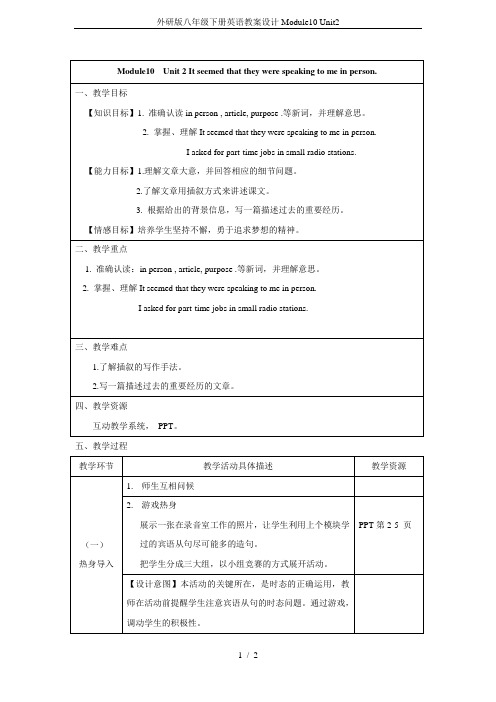
课文学习
1.介绍本课的背景,观看M10U2活动2动画。
PPT第6页
2.第一遍观看,回答:Where does the writer talk about the story?
第二遍,播放动画,完成文章中的细节填空练习。
PPT第6页
PPT第7-8页
3.再次阅读文章,教师带领学生细读课文,学习本文的重点句型及短语,掌握本课的重点知识。
Iasked for part-time jobs in small radio stations.
【能力目标】1.理解文章大意,并回答相应的细节问题。
2.了解文章用插叙方式来讲述课文。
3.根据给出的背景信息,写一篇描述过去的重要经历。
【情感目标】培养学生坚持不懈,勇于追求梦想的精神。
二、教学重点
1.准确认读:in person , article,purpose.等新词,并理解意思。
article
purpose
It seemed that they were speaking to me in person.
Iasked for part-time jobs in small radio stations.
PPT第9页
【设计意图】通过几遍的看、听、阅读,要求学生既要理解文章意思,又要把握文章的知识及句型。
(三)
拓展运用
1.再次阅读文章,找到文章的描察表格,区分重要事件和背景信息。
【设计意图】本活动是帮助学生理解课文结构合叙述方法,为后面的写作做准备。
2.掌握、理解It seemed that they were speaking to me in person.
Iasked for part-time jobs in small radio stations.
新外研版八年级下册英语 Module 10 Unit 3 教案(教学设计)
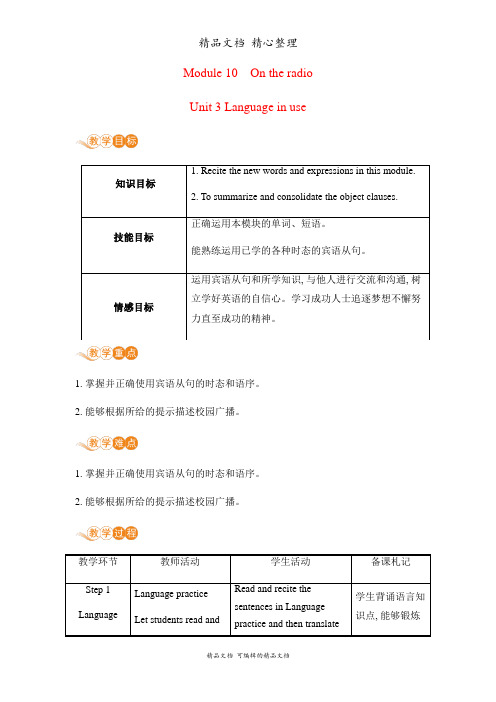
Module 10 On the radio Unit 3 Language in use
1. 掌握并正确使用宾语从句的时态和语序。
2. 能够根据所给的提示描述校园广播。
1. 掌握并正确使用宾语从句的时态和语序。
2. 能够根据所给的提示描述校园广播。
1. Remember all the new words and useful expressions of this module.
2. Try to write down something about your school broadcasting.
根据新课标的要求, 结合教材和学生特点, 主要采用任务型互动式方式进行教学, 结合情景法、交际法、听说法、归纳法等教学方法实施课堂活动,开启学生思维, 通过一系列有条理的教学活动, 引导学生自主探究学习和与他人互动合作学习, 让学生体验学习的快乐。
外研版八年级下册英语教学设计 Module 10
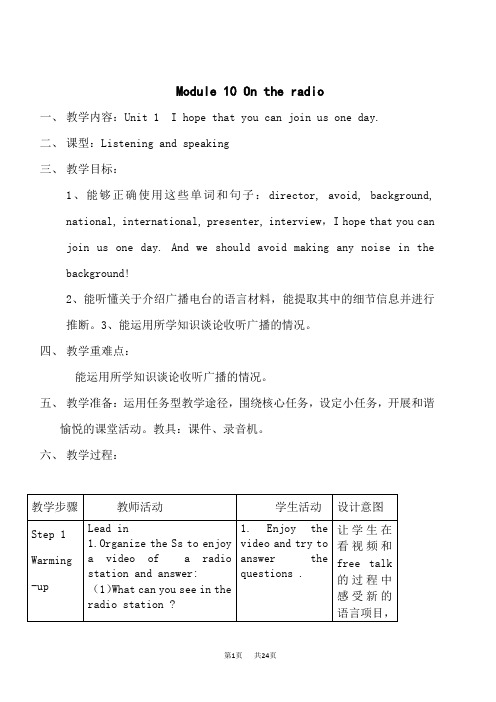
Module 10 On the radio一、教学内容:Unit 1 I hope that you can join us one day.二、课型:Listening and speaking三、教学目标:1、能够正确使用这些单词和句子:director, avoid, background,national, international, presenter, interview,I hope that you can join us one day. And we should avoid making any noise in the background!2、能听懂关于介绍广播电台的语言材料,能提取其中的细节信息并进行推断。
3、能运用所学知识谈论收听广播的情况。
四、教学重难点:能运用所学知识谈论收听广播的情况。
五、教学准备:运用任务型教学途径,围绕核心任务,设定小任务,开展和谐愉悦的课堂活动。
教具:课件、录音机。
六、教学过程:达标训练题一、选择填空( ) 1. He is the famous ______ of Harry Potter.A. directB. directorC. actD. reporter( ) 2. The radio is _____, and we can hear the news now.A. in airB. on airC. to airD. by air( ) 3. We should _______ eating too much meat in our daily life.A. speakB. showC. hearD. avoid( ) 4. -Could I do an ______ with you tomorrow?-Yes, of course.A. interviewB. interviewsC. directorD. directors( ) 5. I didn’t understand _____. So I raised my hand to ask.A. what my teacher saysB. what my teacher sayC. what my teacher saidD. what did my teacher say二、完成句子1. 她很高兴地带我们参观她家。
外研版八年级下册英语精品教学课件 Module 10 Unit 2

Grammar
2. And you want a job in radio? 你想在电台找份工作?
陈述句用升调就变成了问句, 这种问句 称为陈述疑问句。朗读时句尾应该读调。 例如:
The train is in already? 火车已经进站了?
He hasn’t got my letter? 他还没有收到我的信?
Presentation
Read again then fill the table with notes.
Time He was four He was nine As he grew older He was fifteen
What happened
Sat close to the radio, listening to his favorite programmes.
“OK, come with me,” the manager said. I sat down in the studio. He was in another room, behind a glass wall.
Presentation
“OK, let’s do a sound check. Just tell me what you had for breakfast.”
Presentation
listeners but to me in person. At the age of nine, I asked for part-time jobs in small radio stations.
As I grew older, my interest in radio grew. One day I learnt about Internet radio. Once a week, I played my favourite music from my father’s computer, talked about life at school, and hoped someone might be listening.
外研八下英语教案Module10

Module 10 On the radioUnit 1 I hope that you can join us one day.教学过程预习指导一、方法指导1.学生自主预习教材新词汇和短语,做到重点单词能正确发音,明确意思,着重记忆。
2.了解课文主题,搜集相关资料,预读课文。
二、预习检测Ⅰ. 根据语境及所给汉语提示语写出所缺单词。
1. Lily's and Lucy's dreams are to be ________(主持人).2. 8th March is ________(国际的) Women's Day.3. These stories have different ________(背景) information.4. Mr Zhang likes watching ________(国内的) news on TV.5. I don't know why Tina always ________(避免) meeting me at school.6. His job is to do ________(采访) with some famous people.7. I know those two men. They're famous ________(导演) in China.Ⅱ. 根据语境从方框中选择恰当的短语填空,有的需要变换形式。
show sb. around, on air, a little bit, one day, too much, turn on1. Don't drink ____________ coffee, or it's difficult to go to sleep.2. The radio station is ____________ from 6:00 am.3. —Can I ____________ the radio now?—Sorry, you'd better not. Your sister is doing her homework.4. Study hard and ____________ you can enter your dream university.5. —Thank you for ____________.—You're welcome.6. —This room is ____________ dirty.—Don't worry. I'll clean it up right now.Ⅰ. 1. presenters 2. International 3. background 4. national 5. avoids 6. interviews 7. directorsⅡ. 1. too much 2. on air 3. turn on 4. one day 5. showing me / us around 6. a little bit课堂教学Step 1情境导入1. 师生问好,通过课题的朗读直接导入本课的主题,同时借助标题中的问题展开话题的拓展。
外研版八年级英语下册说课稿 Module10 My perfect holiday

外研版八年级英语下册说课稿Module10 My
perfect holiday
说课稿
Module10 Myperfectholiday
题材内容
本模块以“我的理想假日”为话题,借此让学生描述自己的理想假日。
通过本模块的学习,学生进一步学习状语从句的用法,并使用would+v.的结构来谈论imaginarysituation。
为学生提供了充足的语言实际运用的机会。
学生可以围绕这一话题进行大量的听、说、读、写方面的语言实践活动,促使学生更有意识地自觉学习英语。
语法难点仍是状语从句。
教学中教师应随时随地灵活利用各种素材组织教学过程和内容。
充分调动学生的积极性。
教学目标语言知识:
语音能够准确掌握句子的升降调。
词汇
perfect,board,flight,gate,silly,outdoor,business,empty,stomach,burn,enough,everyth ing,college,living,simple,properly,manage
词组so…that…,not…atall,seeoff
语法能使用would谈论假设状况;能使用although,but,so…that引导的状语从句。
功能能够谈论imaginarysituation。
话题以“我的理想假日”为话题。
外研英语初中最后一课教案

外研英语初中最后一课教案一、教学内容本课是外研版初中英语八年级下册《英语》Unit 10Section B 3a 的阅读课。
本节课主要通过阅读一篇小故事,让学生掌握一般过去时的用法,学会描述过去发生的事情。
二、教学目标1. 知识目标(1)能够正确理解一般过去时的概念和用法,能够运用一般过去时描述过去发生的事情。
(2)能够听懂、会说、会读本课的生词和短语,如“go for a walk”、“play on the computer”、“yesterday”等。
(3)能够理解并朗读课文,能够根据课文内容进行适当的填空和回答问题。
2. 能力目标(1)能够通过阅读课文,提高自己的阅读理解能力。
(2)能够运用一般过去时进行简单的口语表达和写作。
3. 情感目标通过学习课文,培养学生的感恩之心,让他们学会珍惜身边的人和事。
三、教学重难点1. 教学重点(1)一般过去时的用法。
(2)课文的阅读和理解。
2. 教学难点(1)一般过去时的句子结构。
(2)根据上下文理解生词和短语的意思。
四、教学方法本节课采用交际法、任务型教学法和情境教学法,让学生在实际的语言环境中学习和使用英语。
五、教学步骤Step 1: Lead-in1. Greeting2. Free talk: Ask students some questions about their daily life, such as“What did you do yesterday?”,“What are you going to do tomorrow?” etc.Step 2: Pre-reading1. Show the pictures of the family and the house in the story, and ask students some questions to elicit their prior knowledge.2. Ask students to guess what happened in the story.Step 3: While-reading1. Ask students to read the text quickly and answer the following questions:(1)What did the family do yesterday?(2)What did the mother do?(3)What did the children do?2. Ask students to read the text again, and answer the following questions:(1)Why did the family go to the park?(2)What did the family have for lunch?(3)How did the children feel when they got home?3. Ask students to read the text again, and complete the chart on P56.Step 4: Post-reading1. Ask students to retell the story in their own words.2. Discuss the following questions with students:(1)What did you do yesterday?(2)What are you going to do tomorrow?3. Ask students to write a short passage about what they did yesterday or what they are going to do tomorrow, using the vocabulary and sentence structure from the text.六、作业布置1. 抄写生词和短语。
外研版(WY)八年级英语下册教学课件Module 10 Unit 1

3. The match is between _C_h_i_n_a_ and _E_n_g_l_a_n_d__.
Presentation
Tapescript
3. Who is Chen Huan? She/He is the news director at Radio Beijing.
4. What is the news while they are at the radio station? Germany has won the football match,2-1 against England.
播出
[ə'vɒɪd] 避免;防止
making any noise in the background.
['bækgraʊnd] 背景;后景
Presentation
Words and expressions
/də'rektə;daI'rektə/ director 导演;主管;经理 n.
/ʃəʊ/ show
Zhang Li: Good afternoon. It's three o'clock, and you're listening to Radio Beijing, with the latest news from China and around the world. I'm Zhang Li. The president of Russia arrived in Beijing today for a three-day visit to China... Now for sports, and we're going over to Wang Lin for the latest report on the football match between China and England. Wang Lin, can
英语八下册外研版module10:教案【unit3】【精品】
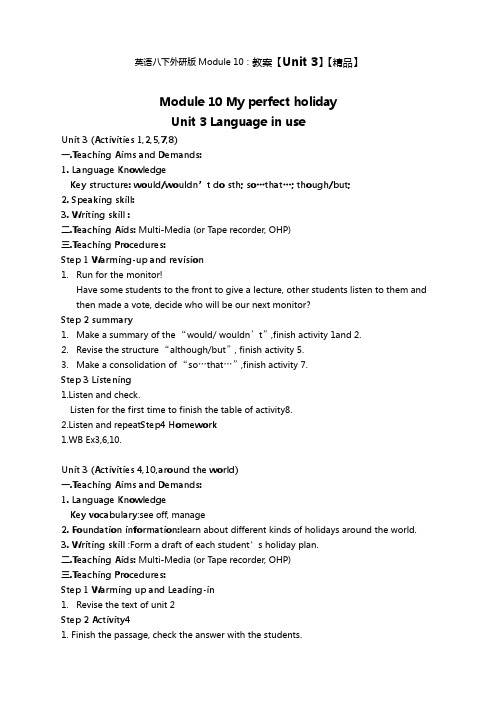
英语八下外研版Module 10:教案【Unit 3】【精品】Module 10 My perfect holidayUnit 3 Language in useUnit 3 (Activities 1,2,5,7,8)一.Teaching Aims and Demands:1. Language KnowledgeKey structure: would/wouldn’t do sth; so…that…; though/but;2. Speaking skill:3. Writing skill :二.Teaching Aids: Multi-Media (or Tape recorder, OHP)三.Teaching Procedures:Step 1 Warming-up and revision1.Run for the monitor!Have some students to the front to give a lecture, other students listen to them and then made a vote, decide who will be our next monitor?Step 2 summary1.Make a summary of the “would/ wouldn’t”,finish activity 1and2.2.Revise the structure “although/but”, finish activity 5.3.Make a consolidation of “so…that…”,finish activity 7.Step 3 Listening1.Listen and check.Listen for the first time to finish the table of activity8.2.Listen and repeat Step4 Homework1.WB Ex3,6,10.Unit 3 (Activities 4,10,around the world)一.Teaching Aims and Demands:1. Language KnowledgeKey vocabulary:see off, manage2. Foundation information:learn about different kinds of holidays around the world.3. Writing skill :Form a draft of each student’s holiday plan.二.Teaching Aids: Multi-Media (or Tape recorder, OHP)三.Teaching Procedures:Step 1 Warming up and Leading-in1.Revise the text of unit 2Step 2 Activity41. Finish the passage, check the answer with the students.Step 3 Activity 10Students have finish it the night before, so the teacher just need to check the answer with the students.Step 4 Around the world1.Show some pictures of the ice hotel. Let students guess where it is.2.Ask questions about the ice hotel.Have them scan the passage of around the world.Answerthe questions.3.Show another group of pictures of a safari holiday.Read WB Ex10.设计意图:把后面的阅读练习提到前面,和书本的背景知识一起呈现给学生,形成一种对比与选择,为后面的写作打下基础;同时也可以完成这部分的阅读任务,提高课堂效率。
外研版英语八年级下册Module 10 教案

Module 10 On the radioUnit 1 I hope that you can join us one day.教学目标【知识与技能】1. 语言目标:能听懂和阅读关于介绍广播电台的语言材料,能编写有关广播的对话。
2. 技能目标:能从课文中明白如何实现理想,实现人生的价值。
【情感、态度与价值观】加强团队合作精神,调动学生的良性竞争意识;了解有关电台实况转播的要素,以及技术发明对人类文明发展的切实意义;了解当下名人成名的奋斗史,用理性的思维体会成功光环背后的努力勤奋与付出。
教学重难点【教学重点】1. 学习重点单词和重点短语on air, avoid doing sth., do an interview with sb.等。
2. 从对话中获取详细信息。
【教学难点】能够给出建议或警告,能够谈论广播节目。
教学准备图片、视频、多媒体等教学过程Step 1 Consolidate new wordsLook and say. The teachers shows the pictures of new words and let the students to Step 2 Leading-inSs look the pictures and answer the questions. say as soon as possible.Step 3 Listening1. Listen Part 1 and check the types of news you hear.2. Listen again and complete the sentences.3. Listen to Part 3 and answer the following questions.1) What should we avoid doing in the background?2) Do they collect the lasted national and international news in the newsroom? Step 4 Reading1. Now complete the notes.2. Find out the object clauses in the dialogue.Step 5 Everyday EnglishLet Ss say the everyday English that they have learnt in the passage.Step 6 Language points1. I’m the news director at Radio Beijing.director “导演,主管,经理”。
外研版英语八年级下册Module 10教案(2021年)
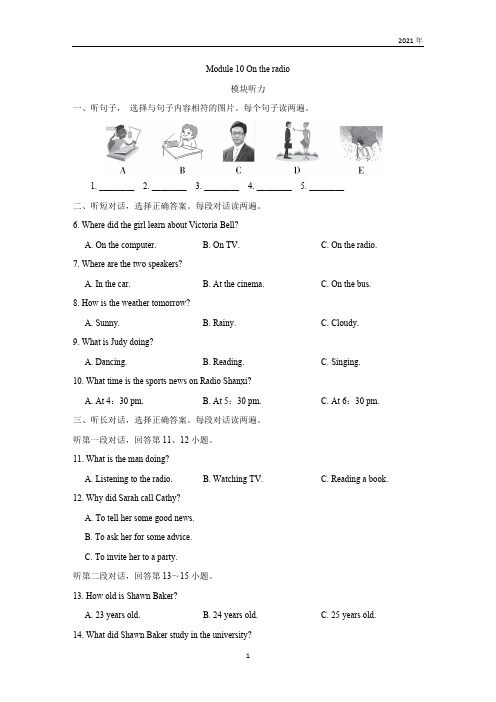
Module 10 On the radio模块听力一、听句子,选择与句子内容相符的图片。
每个句子读两遍。
1. ________2. ________3. ________4. ________5. ________二、听短对话,选择正确答案。
每段对话读两遍。
6. Where did the girl learn about Victoria Bell?A. On the computer.B. On TV.C. On the radio.7. Where are the two speakers?A. In the car.B. At the cinema.C. On the bus.8. How is the weather tomorrow?A. Sunny.B. Rainy.C. Cloudy.9. What is Judy doing?A. Dancing.B. Reading.C. Singing.10. What time is the sports news on Radio Shanxi?A. At 4:30 pm.B. At 5:30 pm.C. At 6:30 pm.三、听长对话,选择正确答案。
每段对话读两遍。
听第一段对话,回答第11、12小题。
11. What is the man doing?A. Listening to the radio.B. Watching TV.C. Reading a book.12. Why did Sarah call Cathy?A. To tell her some good news.B. To ask her for some advice.C. To invite her to a party.听第二段对话,回答第13~15小题。
13. How old is Shawn Baker?A. 23 years old.B. 24 years old.C. 25 years old.14. What did Shawn Baker study in the university?A. News.B. Art.C. Sports.15. How long has he worked in his school radio station?A. For one year.B. For two years.C. For three years.四、听短文,选择正确答案。
外研版八年级WY下册英语精品教学课件 Module 10 Unit 1
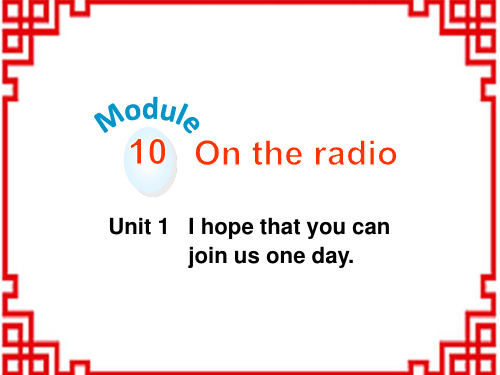
Everyday English
Come this way. It gets crazy in here… That’s great news!
3 Listen and read.
Chen Huan: Hi, everybody. I’m the news director
at Radio Beijing.
Do you like listening to music?
Listening and vocabulary 1 Listen and check (√) the types of news you
hear.
culture
government
√
sports
√
weather
2 Listen again and complete the sentences.
director “导演,主管,经理”,名词。动词为direct。
2. When it’s on, it means we’re on air. on air, “(广播或电视)播出,正在广播”。
例:我们将在大约五分钟后开始广播。 We will be on air in about five minutes.
keep doing sth. 表示“坚持做某事”。
例:继续往上爬,直到你到达山顶。 Keep climbing until you get to the top of the mountain.
for
Wang Lin: Yes, at the moment, the score is China 2,
England 1. China is winning, but there is
still half an hour to go. Back to you, Zhang Li! Zhang Li: Thank you. We are looking forward to the result.
- 1、下载文档前请自行甄别文档内容的完整性,平台不提供额外的编辑、内容补充、找答案等附加服务。
- 2、"仅部分预览"的文档,不可在线预览部分如存在完整性等问题,可反馈申请退款(可完整预览的文档不适用该条件!)。
- 3、如文档侵犯您的权益,请联系客服反馈,我们会尽快为您处理(人工客服工作时间:9:00-18:30)。
外研版八年级英语下册教案Module 10Module 10 My perfect holiday一.教材内容分析本模块话题相对分散,主要是谈论假或想象的话题。
语法现象主要是用would/wouldn’t表达对事情的想象,学生不但要具备并熟练地掌握would /wouldn’t表示假设的技巧,并且要会运用这一技巧进行对出游计划的描述。
教学中应结合学生实际情况,调整教学内容,合理设置课时。
适当进行拓展,以激发学生的学习兴趣,拓宽学生视野。
二、学情分析1.本模块的主要篇章所涉及的内容是学生所熟悉的(如假设家长不在家),但是没有很鲜明的特色,也没有激发学生求知欲的信息沟。
所以在处理教材的过程中需要多设置一些令学生有谈论欲望的话题。
2.would/wouldn’t do sth结构本身比较简单,学生掌握起来难度不大,只要教师稍加指点就行。
三.教学目标1.语言知识目标2.语言技能目标3.学习策略目标4.文化意识目标了解不同地方的旅游资源,互相交流不同国家的文化,对学生进行不同文化意识的渗透。
同时让了解其他国家风景,增加学生的背景知识。
培养学生具有一定的责任意识和关爱他人之心。
5.情感态度目标1)通过课文教学引导学生关注文化,关注社会,关注身边的时事和优秀人物。
2)通过学习送行分别时所用的交际用语,学会与人友好相处。
3)通过谈论不同的假设场景,激发学生的内在情感,学习换位思考,进行情感教育。
4)能在小组活动中积极与他人合作,相互帮助,共同完成学习任务。
四.重点难点1.教学重点以谈论假设的话题为中心,谈论各种情况下的可能性。
2.教学难点1)表达猜想的词汇及它们在句中的正确运用。
2)能用恰当正确的英语介绍个人的旅游计划。
3. 突破途径以话题为核心,通过个人思考、小组及班级活动等不同途径,在听、说、读、写中使句型以不同的形式反复出现,在足够的输入中,达成有效的语言输出,并通过交流获取更多的信息。
五、教材处理1、任务核心任务:能够运用所学句型结构向朋友介绍所去旅游的地方的具体情况以及行程的安排。
三个环节如下:pre-task:学生联系生活实际,激活思维。
Task-cycle:通过整个模块的听说读写的训练,强化“假设和想象”的表达能力,为完成核心任务做好铺垫。
post-task:达成任务,展示成果,自我评价,反馈学习情况。
2、课时安排Period One: Unit 1Period Two: Unit 2Period Three: Unit 3 (Activity 1,2,5,7,8)Period Four: Unit 3 (Activity4,10,around the world)六.教学设计第一课时:Unit 1一.Teaching Aims and Demands:1. Language KnowledgeKey vocabulary:perfect, board, flight, gate, silly, outdoor, so…that…Key structure:would/wouldn’t do sth; so…that…; although2. Listening skill:understand what are Sally and her friends going, help students to be familiarwith some words.3. Speaking skill :practice the structure of “ would/wouldn’t do sth”; express correctly.二.Teaching Aids: Multi-Media (or Tape recorder, OHP)三.Teaching Procedures:Step 1 Revision and Leading in1.Revise the heroes and heroines mentioned in last module.Ask : “Who are they?/What are they?”2.Ask student “What would you like to be?”设计意图:复习前一模块所学的内容,回忆一些英雄人物,由What would you like to be?引出本模块的would的用法;因为这个句型学生比较熟悉,由所学过的句型引出将要学的结构,学生会感觉比较自然,比较好接受。
Step 2 Practice1.Show a picture of Helen Keller, introduce one of her books Three Days to Me.2.Have the students talk in pairs.Suppose: If you are like Helen, you have three days to see,what would you do?/ What wouldn’t you do? Give an example to help them express themselves with “ would/wouldn’t”.3.设计意图:通过英雄人物而引出海伦﹒凯勒,介绍她的一本书,给学生设置了一个假设的状态,从而可以进行would句型的操练;同时在情感教育上,给学生竖立学习的榜样,同时能够意识到自己的幸运,要把握好眼前的学习和生活。
再接着又可以转换到第二个假设:在即将到来的假期,你该如何渡过。
从而进入到该句型的大量口头练习。
Step 3 listening practice(Activity 1&2)1.Show a picture of Sally. Sally’2.Students listen to the conversation and answer the questions.设计意图:通过谈论假日,转换渡假人物,设置图片相关的问题,既是设置悬念,又做好听力练习前的准备和铺垫工作。
学生可以学习有的放矢的听力方法。
Step 4 Listen and read1. Ask: “ Where will Sally go?” and “Where would Sally’s friends go?”2. Show the table, ask the students to finish it after listening.3.Finish activity2 and 3,check the answers with the students.Discuss when necessary.4.Finish the table.Students ask and answer in pairs.设计意图Step 5 practice1.Make clear the difference between “will” and “would” by pictures.2.Practice the use of “so…that…”.3. Practice the use of “although/but”, pay special attention that these two words mustn’t be used in one sentence.设计意图:这是第一节课向学生呈现would的用法,要使得学生能够区别will与would.但是用语言直接表述并不合适,所以利用图片进行处理,让学生在真实的语言环境中体会两个词所传达的语意的不同。
在so...that..句型和although句型切换时采用同一幅图,使过渡比较自然,同时能培养学生的发散性思维。
Step 7 Homework1.Workbook page133,Ex2,5.2.Finish Unit3 activity1,2 on your book.3.Preveiw Unit2. Finish page82 Ex2,3.4.Suppose if you are a teacher.What would you do? /What would not you do?设计意图:扎实基础,完成书本关于本节课的相关练习。
学习换位思考,假设你是老师,你会做些什么,不做什么。
也是老师从学生中间吸取一些有意义的建议的机会。
第二课时:Unit 2一.Teaching Aims and Demands:1. Language KnowledgeKey vocabulary:business, empty, stomach, burn, enough, everything, college, living, simple, properly,Key structure: would/wouldn’t do sthnot…at all…2. Reading skill: Reading for specific information3. Speaking skill : express “would / wouldn’t do sth” practically and coherently.二.Teaching Aids: Multi-Media (or Tape recorder, OHP)三.Teaching Procedures:Step 1 Revision and check the homework1.Revise the use of “so…that…”. Make sentences while looking at the pictures.2.Present the homework of students. “If you are a teacher…”Show their homewok by OHP, have the student present at the front of the class.设计意图:这个环节既可以检查学生的回家作业情况,又是对所学内容的复习。
在学生有所准备的情况下,一些优良学生的陈述将会是可以有所期待的。
Step 2 Discussion(pair work or group work)1.Have them discuss: How would you watch the games? Would you go to Beijing to watchgames? etc.2.Discussion 2: Ask student: “Have you ever seen the film ‘Home Alone’?” If your parentsare not at home, would you look aftre yourself? Would your life be ok?设计意图:通过两个讨论,目的之一是为了在前一节课的基础上,学生由已经会说would句型,到让学生能较自由地表达,表达追求准确和流畅。
